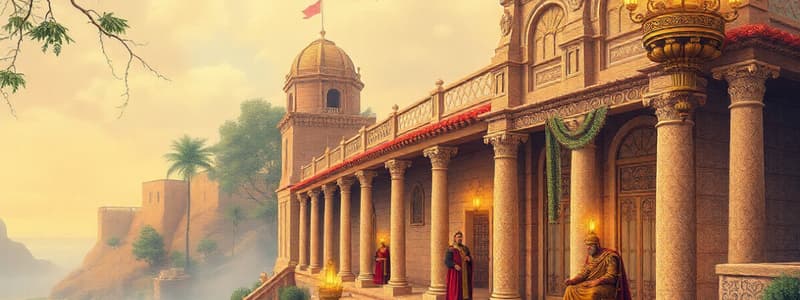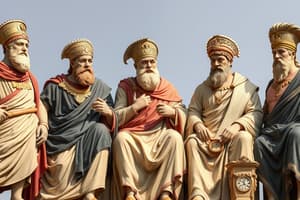Podcast
Questions and Answers
What was the primary reason for the Roman Empire's long-lasting power?
What was the primary reason for the Roman Empire's long-lasting power?
- Advanced agricultural practices
- Superior naval technology
- Democratic governance
- Effective military tactics (correct)
The Romans allowed the Jewish people to govern themselves completely without Roman interference.
The Romans allowed the Jewish people to govern themselves completely without Roman interference.
False (B)
What was the Sanhedrin?
What was the Sanhedrin?
The Sanhedrin was the religious governing body and highest court of Jewish law in Jerusalem.
The Jewish people called their God ______.
The Jewish people called their God ______.
Which role did tax collectors play in Palestine during Roman rule?
Which role did tax collectors play in Palestine during Roman rule?
The Temple in Jerusalem was important in Jewish life as the dwelling place of God and a place to offer sacrifices.
The Temple in Jerusalem was important in Jewish life as the dwelling place of God and a place to offer sacrifices.
What was the role of the Roman governor (procurator) in Palestine?
What was the role of the Roman governor (procurator) in Palestine?
The most sacred part of the Temple was called the ______ of ______.
The most sacred part of the Temple was called the ______ of ______.
Match the following groups with their descriptions:
Match the following groups with their descriptions:
Why was Palestine considered strategically important to the Roman Empire?
Why was Palestine considered strategically important to the Roman Empire?
The synagogues in every town and village were only used for religious services.
The synagogues in every town and village were only used for religious services.
What was the role of prophets in the Old Testament?
What was the role of prophets in the Old Testament?
The belief in a promised leader sent by God is known as ______ expectation.
The belief in a promised leader sent by God is known as ______ expectation.
Where did the Essenes live, and what was a notable artifact associated with them?
Where did the Essenes live, and what was a notable artifact associated with them?
The Romans primarily practiced monotheism, believing in one God, similar to the Jewish people.
The Romans primarily practiced monotheism, believing in one God, similar to the Jewish people.
Name at least two activities that took place during a Sabbath service in the Synagogue.
Name at least two activities that took place during a Sabbath service in the Synagogue.
The collected scrolls were kept in a special part of the synagogue called the ______.
The collected scrolls were kept in a special part of the synagogue called the ______.
What was the 'Court of the Gentiles' used for in the Temple?
What was the 'Court of the Gentiles' used for in the Temple?
The Roman Empire invaded the land of Palestine in 40 BC.
The Roman Empire invaded the land of Palestine in 40 BC.
What continents was Palestine at the crossroads of?
What continents was Palestine at the crossroads of?
Flashcards
The Roman Empire
The Roman Empire
The empire originating from Rome that controlled the Mediterranean and beyond for over 500 years.
Palestine
Palestine
The region under Roman rule when Jesus was born.
Tax Collectors
Tax Collectors
People who collected taxes for the Romans, often seen negatively.
Jewish Faith Origins
Jewish Faith Origins
Signup and view all the flashcards
Yahweh
Yahweh
Signup and view all the flashcards
Sanhedrin
Sanhedrin
Signup and view all the flashcards
Synagogue
Synagogue
Signup and view all the flashcards
The Temple
The Temple
Signup and view all the flashcards
Pharisees
Pharisees
Signup and view all the flashcards
Sadducees
Sadducees
Signup and view all the flashcards
Zealots
Zealots
Signup and view all the flashcards
Prophet
Prophet
Signup and view all the flashcards
The Messiah
The Messiah
Signup and view all the flashcards
Study Notes
The Roman Empire
- The Romans originated from Rome, Italy
- The Roman Empire was headed by an Emperor
- The Empire's duration exceeded 500 years
- The Roman army's superior fighting tactics contributed to its long-lasting power
- The Romans gained control over the lands surrounding the Mediterranean Sea
- The Empire expanded into Europe and North Africa
- Palestine was under Roman rule when Jesus was born
- Palestine's strategic position was at the crossroads of Europe, Africa, and Asia
- The Romans recognized that controlling Palestine meant controlling access to the region's roads
- In 63 BC The Romans invaded Palestine and took control of Jerusalem then the whole country
- Governors were appointed by Romans to ensure Jewish people followed Roman laws and paid taxes
- In exchange the Jewish people could retain their customs and religion
- The Jews did not accept Roman rule, they believed Palestine was given to them by God
Tax Collectors
- People in Palestine lived simple lives during Jesus' time
- They earned just enough money for basic needs
- Heavy taxes were imposed, and they were used to support the Roman army in Palestine
- Tax collectors were Jewish people who collected the taxes
- Most Jews disliked tax collectors because they worked for the Romans
- Some tax collectors were dishonest and enriched themselves by keeping part of the collected money
Political & Religious Structures in the Time of Jesus
- Jesus was born into the Jewish faith
- The Jewish faith originated from God's relationship with Abraham and Moses
- God called Abraham from Mesopotamia (modern Iraq) to Canaan
- God made a covenant with Abraham, and his descendents would be chosen people of God if they obeyed God's laws
- Abraham's descendants settled in Canaan, later moving to Egypt, where they were enslaved
- Moses, freed the Israelites from slavery leading them to the Promised Land
Political Structures in the Time of Jesus
- The Israelites were initially ruled by prophets called Judges, then Kings, starting with Saul, David, and Solomon
- After Solomon’s death, the land divided into the Kingdom of Israel and the Kingdom of Judaea
- By 63 BC, the Romans conquered the land and renamed it Palestine
- In 40 BC, Herod was appointed as king
- Herod was not Jewish, so he wasn't accepted by the Jewish population
- Palestine, known as the Holy Land, was part of the Roman Empire during Jesus’ time
- Roman laws and customs were imposed on the Jewish people, which caused great tension
- Caesar, the Roman Emperor, allowed Herod to be a token leader, but appointed governors to take care of Roman interests
- Pontius Pilate was the Roman governor (procurator) from AD 26 to 36 and maintained law, order and tax collection in Palestine
- The Romans were polytheistic while the Jews were monotheistic, believing in one God called Yahweh
- Romans allowed the Jewish people to practice their religion to maintain peace and governance
The Sanhedrin
- The Sanhedrin was the religious governing body and highest court of Jewish law in Jerusalem, Palestine
- It consisted of Sadducees and Pharisees, two religious groups with differing views, and was presided over by the High Priest
- Romans granted the Sanhedrin the power to act as a law court, punish Jews for breaking Jewish law, and maintain its own guards to keep order
- Romans strategically enabled a situation where the two main Jewish groups conflicted with each other
Temple and Synagogue
- During Jesus' time, Jews worshiped at the Temple in Jerusalem and in Synagogues in towns and villages
The Temple
- The most sacred building for the Jewish people was the Temple in Jerusalem
- It was a cream colored stone building covered in gold and very large
- Jews visited at least once a year during a Jewish festival
- They would come with their families to pray and offer sacrifices
- The Temple included the Court of Gentiles, where Roman money was exchanged for temple money, and birds and animals could be purchased for sacrifices
- Temple priests performed sacrifices on the altar in the Court of Priests
- Only priests were allowed into the Court of Priests
- The Holy of Holies was the most sacred part of the Temple, it could only be entered by the High Priest once a year
- The High Priest would offer sacrifice and pray for God's forgiveness
- Romans destroyed the Temple in Jerusalem in 70 AD, with only a wall remaining
The Synagogue
- In Jesus' time every town and village in Palestine had a synagogue
- Synagogues were meeting places for the Jewish community
- Jews attended weekly Sabbath services to pray and listen to the scriptures
- Synagogues were plain two-story buildings holding 50-100 people
- They had a porch and two doors with Women in a gallery and men and boys downstairs
- Sabbath services included prayers, hymns, and readings from Jewish scripture by a rabbi who then gave a talk about the readings
- The scrolls were kept in a special area called the Ark which was treated with great respect
- A curtain was drawn in front of the Ark, and a light burned near it representing God was with them
- A special candle holder called a menorah held seven candles
- The Sabbath service concluded after an hour with a blessing
Religious Groups in the Time of Jesus
- Pharisees were holy men who studied God's law
- Pharisees were not priests, but ordinary family men
- Pharisees lived in the towns and villages of Palestine
- They led local synagogues, and taught people how to adhere to God's law by teaching hundreds of small rules
- Pharisees followed the rules and avoided those who didn't
- The Pharisees concentrated on religious practice and didn't cooperate with the Romans, hoping for Jewish liberation from Roman rule
- Sadducees were religious leaders and priests from rich Jewish families who led the Temple in Jerusalem
- The high priest in the Temple was always a Sadducee
- The Romans allowed the Jews to practice their religion and judge their own people
- The Sanhedrin, based in the Temple, was the Jewish court of law
- Most members of the Sanhedrin during Jesus' time were Sadducees
- Sadducees cooperated with the Romans to maintain their position in the Temple
- Zealots were nationalists who hated the Roman conquerors because they believed Palestine was God's gift to the Jewish people
- Zealots did not cooperate with the Romans and resorted to violence to force them out of Palestine
- Romans considered them terrorists, while many Jews considered them freedom fighters
- Essenes lived strict religious lives in the desert
- Essenes sought to keep the Jewish religion pure, believing themselves the true people of God
- Scrolls, possibly from their library, were found in Qumran, north of the Dead Sea, in 1948
The Messiah
- Old Testament prophets foretold that God would send a great leader
- This leader was known by the Jews as the Messiah, meaning "anointed one"
- The anointment of leaders with oil signified they were blessed and chosen by God to do good work
- Opinions varied on the Messiah's identity
- Some thought the Messiah would be a mighty King David descendant bringing prosperity and liberation
- Others thought it would be a great warrior using force to drive the Romans out of Palestine
- Christians today believe that Jesus is the Messiah
- Jews believe the Messiah has yet to come
Studying That Suits You
Use AI to generate personalized quizzes and flashcards to suit your learning preferences.




